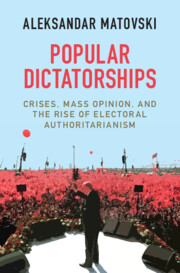Crossref Citations
This Book has been
cited by the following publications. This list is generated based on data provided by Crossref.
Nadporozhskii, Ilia
2023.
Influence of elite rotation on authoritarian resilience.
Democratization,
Vol. 30,
Issue. 5,
p.
794.
Jungherr, Andreas
2023.
Artificial Intelligence and Democracy: A Conceptual Framework.
Social Media + Society,
Vol. 9,
Issue. 3,
Zeng, Yu
He, Junzhi
and
Lü, Xiaobo
2024.
Constituency Service and Valence Voting in Semi-Competitive Elections: Theory and Evidence From China.
Political Studies,
Birch, Sarah
2024.
Semi-parliamentarism and the challenges of institutional design.
Critical Review of International Social and Political Philosophy,
Vol. 27,
Issue. 2,
p.
266.
Aarslew, Laurits F.
2024.
Does Election Fraud Erode Support for Autocrats?.
Comparative Political Studies,
Vol. 57,
Issue. 12,
p.
1978.
Sharafutdinova, Gulnaz
2024.
Authoritarian welfare and resilience: politics of child benefits in Russia.
Post-Soviet Affairs,
Vol. 40,
Issue. 4,
p.
326.
Zeng, Yu
He, Junzhi
and
Lu, Xiaobo
2024.
Constituency Service and Valence Voting in Semi-Competitive Elections: Theory and Evidence of China.
SSRN Electronic Journal,
Neundorf, Anja
Ozturk, Aykut
Northmore-Ball, Ksenia
Tertytchnaya, Katerina
and
Gerschewski, Johannes
2024.
A Loyal Base: Support for Authoritarian Regimes in Times of Crisis.
Comparative Political Studies,
LUCAS, JACK
SHEFFER, LIOR
LOEWEN, PETER JOHN
WALGRAVE, STEFAAN
SOONTJENS, KAROLIN
AMSALEM, ERAN
BAILER, STEFANIE
BRACK, NATHALIE
BREUNIG, CHRISTIAN
BUNDI, PIRMIN
COUFAL, LINDA
DUMONT, PATRICK
LACHANCE, SARAH
PEREIRA, MIGUEL M.
PERSSON, MIKAEL
PILET, JEAN-BENOIT
RASMUSSEN, ANNE
STERBA, MAJ-BRITT
and
VARONE, FRÉDÉRIC
2024.
Politicians’ Theories of Voting Behavior.
American Political Science Review,
p.
1.
Del Real, Deisy
and
Menjívar, Cecilia
2024.
The Tools of Autocracy Worldwide: Authoritarian Networks, the Façade of Democracy, and Neo-Repression.
American Behavioral Scientist,
Vol. 68,
Issue. 12,
p.
1559.
Gidron, Noam
Margalit, Yotam
Sheffer, Lior
and
Yakir, Itamar
2025.
Why masses support democratic backsliding.
American Journal of Political Science,
LETSA, NATALIE WENZELL
2025.
Partisanship and Political Socialization in Electoral Autocracies.
American Political Science Review,
Vol. 119,
Issue. 1,
p.
208.
Windecker, Paula
Vergioglou, Ioannis
and
Jacob, Marc S.
2025.
Living in Different Worlds: Electoral Authoritarianism and Partisan Gaps in Perceptions of Electoral Integrity.
British Journal of Political Science,
Vol. 55,
Issue. ,
Walter, Tony
2025.
Resonance and alienation in dying.
Mortality,
p.
1.
Wunsch, Natasha
Jacob, Marc S.
and
Derksen, Laurenz
2025.
The Demand Side of Democratic Backsliding: How Divergent Understandings of Democracy Shape Political Choice.
British Journal of Political Science,
Vol. 55,
Issue. ,
Metreveli, Tornike
2025.
(Re)Conceptualizing Covenantal Pluralism in Georgia: Interfaith Dynamics on Orthodox Terms.
The Review of Faith & International Affairs,
Vol. 23,
Issue. 1,
p.
57.
Nord, Marina
Angiolillo, Fabio
Lundstedt, Martin
Wiebrecht, Felix
and
Lindberg, Staffan I.
2025.
When autocratization is reversed: episodes of U-Turns since 1900.
Democratization,
p.
1.



